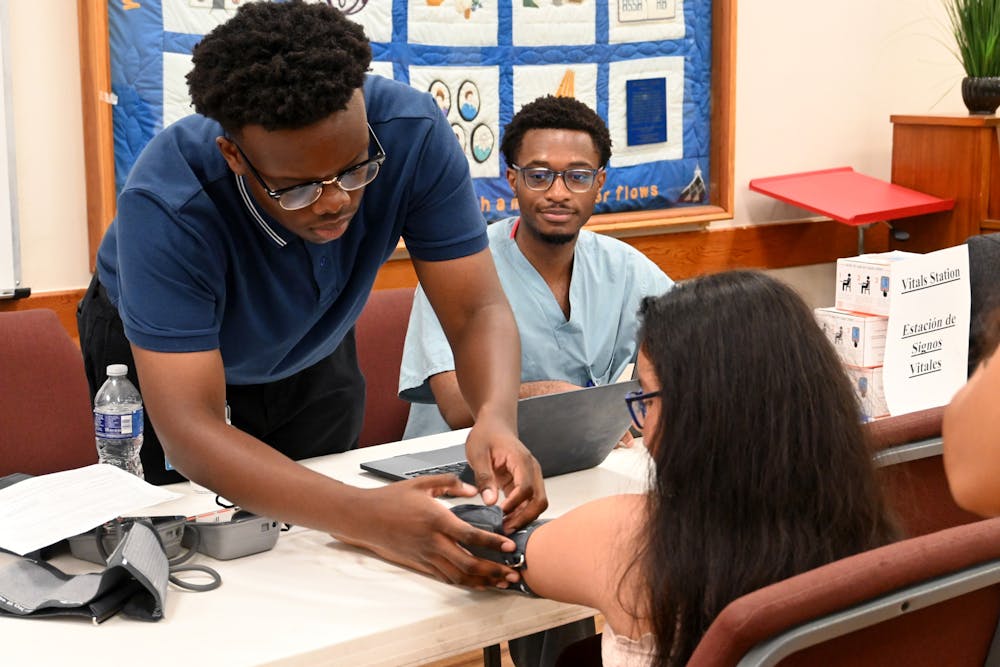Lined up outside Parkview Baptist Church, several families sought essential medical services with no cost, no insurance or documents required.
Along with free transportation and meals, attendees received pediatric and adult consultations, school physicals, gynecology checkups, colon and cervical cancer screenings, and tests for diabetes, blood pressure, anemia and cholesterol. Services were offered in multiple languages, including English, Spanish, Portuguese and Haitian Creole.
The event was designed to help families start the new school year successfully with medical checkups and backpacks with basic school supplies.
According to recent analysis by the Kaiser Family Foundation, nearly half of U.S. adults struggle to cover medical expenses, and one in four had difficulty affording care in the past year. More than one-third admitted to delaying or avoiding necessary appointments due to cost, highlighting how financial barriers affect access to healthcare.
Maria Eugenia Zelaya, executive director of Children Beyond Our Borders, said the fair aimed to reduce barriers to healthcare for those without insurance or resources to pay for medical consultations.
“Our job here is to welcome anyone who doesn’t have access to medical services and connect them with services that can provide follow-up care,” Zelaya said.
The fair also distributed backpacks with school supplies, crayons, coloring pages and teddy bears for children returning to school.
The event was designed to help families start the new school year successfully with medical checkups and backpacks with basic school supplies.
The health fair was supported and organized by Children Beyond Our Borders, Equal Access Clinic Network, Mobile Outreach Clinic, UF Health Cancer Center, Project Continuity and Parkview Baptist Church.
Jamie Hensley, assistant director of cancer screening and care navigation at the UF Health Cancer Center, said her team seeks to bring preventive services to the entire community.
“We help people understand what their cancer risk factors are, what their screening options are, what screenings they’re eligible for and how to access them with or without insurance,” Hensley said.
An analysis presented at the 2025 American Society of Clinical Oncology Annual Meeting, where nearly 1,800 cancer survivors attended, showed 19% had to delay or skip medical care due to costs, while 13% faced housing issues. It creates a difficult cycle where economic and social limitations directly affect health.
Hensley emphasized the importance of knowing family history to prevent serious illnesses.
“If you haven't talked to your family about what diseases and what cancers may run in your family, find out so that you can be better equipped to take care of yourself,” Hensley said.
Veronica Diaz, a 40-year-old Gainesville resident from Colombia, attends the fair with her family every time the fair takes place.
“The fair has truly been a great support for many people and the community,” Diaz said. “My whole family has benefited. We are truly grateful.”
The fair gives her family access to different medical services, she said. Diaz was able to get gynecological checkups, her daughter received pediatric consultations and her husband received general medical care.
Michael Mathelier, a first-year resident in the UF Department of Emergency Medicine and health fair adviser, said the fair is an opportunity to provide primary care to those who need it most.
“The care that we provide here is free to the patient,” Mathelier said. “They don't pay anything. All the doctors here, they're volunteering their time.”
More than 2.3 million Florida residents lacked health insurance in 2023, representing 10.7% of the state population compared to 8% nationwide, according to the Kaiser Family Foundation.
The fair is an accessible option for those who cannot go to a clinic during the week, Mathelier said. Many people travel from cities like Jacksonville, Orlando and Tampa to take advantage of the free care, he added.
Gladys Cordova, a 64-year-old Gainesville resident from Chile, volunteers in the kitchen area but was initially an attendee. Grateful for the help she received in the past, she now offers the same support to others.
“When you’re a migrant, it’s such a blessing to be given a helping hand,” Cordova said. “This is my way of giving back for the help I once received.”
Contact Candy Fontana-Verde at cfontanaverde@alligator.org. Follow her on X @CandyFontanaV.






